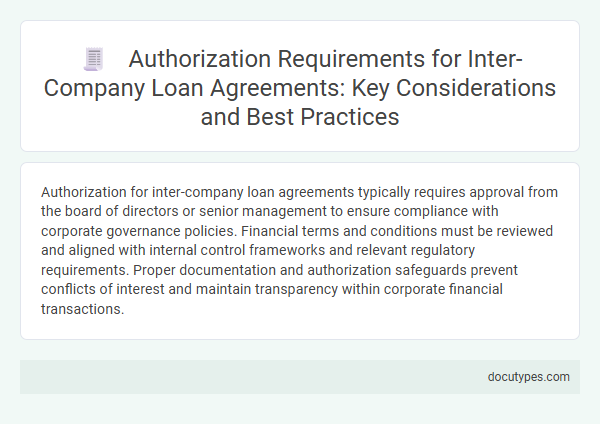Authorization for inter-company loan agreements typically requires approval from the board of directors or senior management to ensure compliance with corporate governance policies. Financial terms and conditions must be reviewed and aligned with internal control frameworks and relevant regulatory requirements. Proper documentation and authorization safeguards prevent conflicts of interest and maintain transparency within corporate financial transactions.
Introduction to Inter-Company Loan Authorization
Inter-company loan agreements involve financial transactions between related business entities within the same corporate group. Authorization ensures these loans comply with internal policies and regulatory requirements.
Proper authorization protects against financial risks and maintains transparency in corporate accounting. This process typically requires approval from senior management or the board of directors to validate the loan terms and conditions.
Legal Framework Governing Authorization
Authorization for inter-company loan agreements is governed by a robust legal framework that ensures compliance with corporate laws and financial regulations. You must secure approvals from relevant corporate bodies and adhere to statutory requirements to legitimize the loan arrangement.
The legal framework includes company law provisions, securities regulations, and internal governance policies that dictate the authorization process. Board resolutions or shareholder approvals are often mandatory before finalizing such agreements. Proper documentation and regulatory filings may also be required to validate the inter-company loan under applicable jurisdictional laws.
Board and Shareholder Approval Requirements
| Aspect | Details |
|---|---|
| Board Approval | Inter-company loan agreements typically require formal approval from the board of directors of both the lending and borrowing entities. The board must review and authorize the loan terms, interest rates, repayment schedules, and ensure compliance with corporate governance policies. Documentation of the board resolution is essential for legal and regulatory purposes. |
| Shareholder Approval | Shareholder approval may be necessary depending on the jurisdiction, company bylaws, and the loan amount relative to the company's capital. If the loan significantly impacts the financial position or involves a substantial portion of company assets, obtaining shareholder consent at a general meeting is often mandated. This step ensures transparency and protects shareholder interests. |
| Regulatory Compliance | Authorization must align with relevant corporate laws and financial regulations. Certain jurisdictions require additional approvals from regulatory bodies, especially if the loan exceeds specified thresholds or involves affiliated entities. Ensuring compliance mitigates legal risks and supports governance standards. |
| Documentation | Resolutions from both the board and shareholders must be documented and retained as corporate records. Proper documentation facilitates audit trails, supports future disputes resolution, and confirms adherence to statutory requirements for inter-company lending. |
Role of Corporate Governance in Loan Authorization
Authorization for inter-company loan agreements typically requires approval from the board of directors or a designated corporate committee. Corporate governance frameworks establish clear protocols to ensure that loan terms align with the company's financial policies and risk management strategies. Strong governance roles help prevent conflicts of interest and promote transparent decision-making during loan authorization processes.
Documentation and Recordkeeping Standards
Authorization for inter-company loan agreements requires strict adherence to documentation and recordkeeping standards to ensure legal compliance and financial transparency. Proper authorization typically involves approval from designated corporate officers or boards based on company policy and jurisdictional regulations.
Comprehensive records must include the loan agreement, approval resolutions, and evidence of compliance with internal credit policies. Maintaining accurate documentation safeguards your company during audits and supports enforceability in case of disputes.
Risk Assessment and Credit Evaluation Processes
Authorization for inter-company loan agreements requires thorough risk assessment and credit evaluation processes to ensure financial stability and compliance. Your approval depends on identifying potential risks and verifying creditworthiness between entities.
- Risk Assessment - Evaluates the financial and operational risks associated with the loan to mitigate potential losses.
- Credit Evaluation - Analyzes the borrowing entity's credit history and repayment capacity to confirm reliability.
- Compliance Authorization - Ensures all loans meet legal and regulatory standards before final approval.
Compliance with Tax and Regulatory Obligations
Authorization for inter-company loan agreements requires strict compliance with both tax laws and regulatory obligations to avoid legal penalties. Tax authorities often mandate detailed documentation, including transfer pricing justifications and interest rate validations, ensuring loans are conducted at arm's length. Your company must obtain necessary approvals from internal governance bodies and adhere to external regulatory filings to maintain transparent and lawful financial transactions.
Internal Controls and Delegation of Authority
What authorization is needed for inter-company loan agreements? Internal controls require clear approval processes to ensure compliance and risk management. Delegation of authority must be documented, specifying who can approve loan terms within your organization.
Common Pitfalls and How to Avoid Them
Authorization for inter-company loan agreements requires strict adherence to company policies and regulatory frameworks. Common pitfalls often involve inadequate approvals and lack of proper documentation.
- Insufficient Approval Processes - Not securing necessary board or executive approvals can invalidate loan agreements.
- Poor Documentation - Failing to document terms clearly increases legal and operational risks.
- Ignoring Regulatory Compliance - Overlooking local and international financial regulations can lead to penalties and contract disputes.
What Authorization Is Needed for Inter-Company Loan Agreements? Infographic

